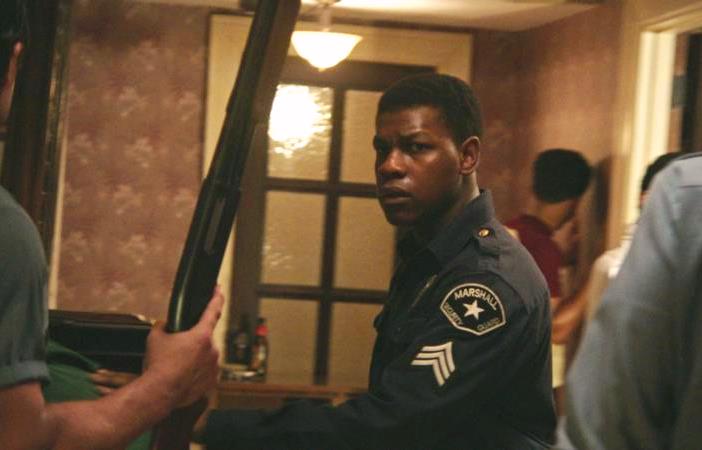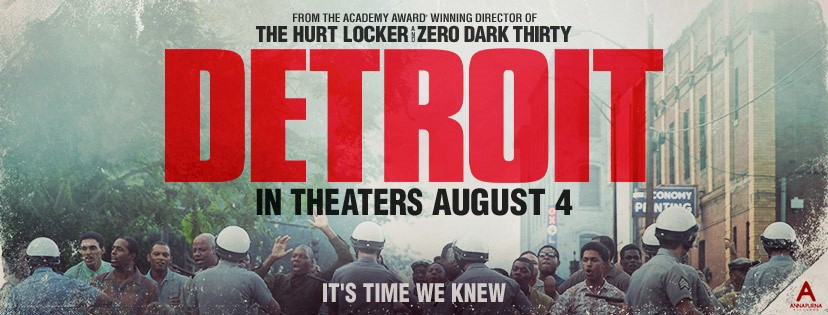
It’s a seismic work of art like “Do the Right Thing,” and it would be a mistake to dismiss it as anything less. I’m still trying to gauge how Detroit will tower over film history, but it is hard to know until the publicity machine decides how it will herald the film in the public eye – I can’t imagine that it won’t make waves, especially since the violence demonstrated in the film is comparable to the violence against black people in the news in Texas, Baltimore, Mississippi, well, all over America in recent times. It’s bound to be talked about. “The Hurt Locker” director Kathryn Bigelow brings the 1967 riots in Motor City to life with harrowing specificity, and also wisely shows how some blacks tried to carry on with life and not let the police antagonism get to them – and some paid dearly with their lives for doing that.
Bigelow takes a cue from the 1968 film “The Battle of Algiers” which was markedly the first to use verité documentary realism to film a docudrama about terrorist outbreak. It also used naturalism in its roving conversations, and as a result, any artifice was dropped and you just accepted the thing as you would a documentary – it is a documentary of violent events happening before your very eyes. As difficult as that filming approach is, Bigelow has done it and even upped that ante. The people in “Detroit” are actors, with dialogue, even speech, but it sounds like it springs from natural conversation, matching the raw, naturalistic pandemonium of what was happening around them.
The riots started after the police went on a raid of a nightclub, with the excuse being they didn’t have a proper liquor license to operate with. But the implication is immediately this: White folk and white cops didn’t want black people to have fun, or a social life, or a hangout, or, name your excuse. And it was a predominantly black neighborhood anyway, but no matter. The whites are bullies. Some reactionary blacks were furious (rightly), and some firebombed various white businesses. The next day, the National Guard was called in with permission to discharge their weapons when provoked. Local policemen were more prone to be provoked by this and that, all too easily. Some of the looters of the city were sympathetic, they were simply trying to get soup and bread home to their families. Yet the most racist of policemen (Will Poulter, as one of them, in a scary and hair-trigger performance) engaged with the looters as if they were the most violent of Earth’s offenders.
More than halfway in, “Detroit” has a scene that’s thirty minutes long, and it’s probably the most riveting, and highly dramatic, thirty minutes scene ever filmed. Never has police brutality been so explicit in a major motion picture, and it’s cathartic to get all its ugly and vicious truth because it’s so real and detailed. It became for me a watershed moment to really feel the violence and hate that black people in that 1960’s civil rights movement era (and even our era, too) had to stomach. Three policemen in particular line up black suspects and two white girls at the Algiers motel and interrogate them brutally until they give up a supposed gun that is hidden. Of course, the police are working with wrong information but it never stops them from trying to use abusive force to wash over their mistakes.
Most of the film is compiled by a series of jagged cuts and moments – it ends us hallucinating us that way when we think back after its over, it’s like a crushing mosaic of heated racial conflict and injustice – but when it zeroes in on its central long event, it’s more static, and intimate. But the audacity of its direction is unparalleled, it even has me wondering if its more powerful than Spike Lee’s “Do the Right Thing.”
There is still much more story, one that never cuts short from honesty. We always feel we are watching real genuine human beings before our eyes, not script puppets. John Boyega (“Star Wars: The Force Awakens”) is a security guard and diplomatic agent to get some of the more hostile whites off the backs of his neighbors. This being Motown, some of the local musicians tried to continue on with their lives and perform in concert – which are broken up, conveying that those headed towards living very excellent lives were stonewalled, lives to be made trivialized. The lead singer of the Dramatics, Larry Reed (Algee Smith), refused to lay down. Then there’s Anthony Mackie who does a miraculous job by giving three-dimensions to a barely seen characters, as a Vietnam Vet who gets that the best way to deal with the police is to be meek yet at the same show strength and integrity.
“Detroit” is no casual night out at the movies, it is violent and hard but intends to open up the mind with unblinking truth, and the heart with empathy. Bigelow is the most successful female director in Hollywood with perhaps ten strong credits to her name, and an Oscar for “The Hurt Locker” to seal her legacy, but “Detroit” is her masterpiece.
Note: The 1968 French film “The Battle of Algiers” has nothing to do with the Algiers motel incident as depicted in Bigelow’s film. It dealt with terrorism during the Algerian war.
143 Minutes. Rated R.
HISTORICAL DRAMA / GRAPHIC VIOLENCE / MASTERPIECE VIEWING
Film Cousins: “The Battle of Algiers” (1968, France); “Do the Right Thing” (1989); “4 Little Girls” (1997); “Selma” (2014).





